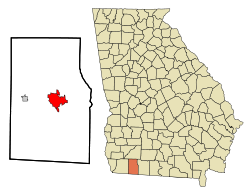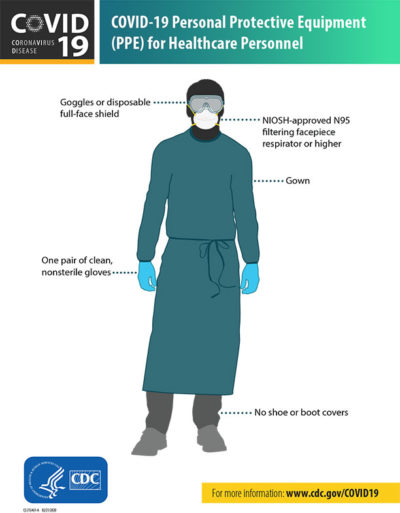Despite communities donating it, state efforts to procure it, corporations scrambling to produce it, and new ways to disinfect it, personal protective equipment remains in short supply.
“PPE continues to be a struggle for us,’’ Homer Bryson, director of the Georgia Emergency Management and Homeland Security Agency, told reporters Monday.

Take the case of a medical practice in Cairo, a small town in southwest Georgia.
People and organizations in the community have donated cloth-based masks to the practice, and local businesses have donated gowns.
But suppliers and the local public health department haven’t met the persistent PPE needs of Cairo Medical Care, says Carol Lawler, office manager. “We’ve had enough to get by,’’ she says. “We’re using our surgical masks all day.’’
Small, rural medical providers often appear to be left out of the PPE distribution chain, Lawler adds.
Medical providers need PPE – gloves, masks, N95 respirators, gowns, face shields – to protect themselves from the highly contagious disease.
Dr. Zita Magloire, a family medicine doctor at the Cairo practice, says that at a local hospital, N95 respirators are being used, then stored in a bag afterward for reuse after a sanitizing procedure. Meanwhile, the Cairo practice is seeing more COVID-19 patients, Magloire says.
The national stockpile of this protective gear has been depleted. GEMA is in charge of procuring PPE, and the Georgia Department of Public Health decides where the supplies go.

“We have a pretty good supply’’ of PPE now, says GEMA spokesman Lisa Rodriguez-Presley. But she adds, “Everybody needs it.’’
Hospitals across Georgia are asking for help on PPE, according to Health Connect South, which is serving as an ad-hoc clearinghouse for supplies.
“Several rural hospitals are running out of gowns and PPE in general,’’ says Jimmy Lewis of HomeTown Health, an association of rural hospitals in the state.

Hospitals are getting the protective gear wherever they can – from suppliers, the state GEMA, donations – and some are even borrowing it from other facilities. The Georgia Hospital Association says several new vendors are supplying masks and other PPE made in China, but those shipments take time to arrive in the U.S., be cleared for entry and then sent to their intended destinations.
“The lag time from order to arrival could be weeks in some instances, says Anna Adams, a GHA vice president.
The state is obtaining an FDA-approved decontamination system to sterilize N95 masks for reuse in less than 72 hours, Adams says. “Hospitals will be able to send their N95 supplies for sterilization, and we are hopeful that this will reduce some of the burden of obtaining supplies.’’
Local PPE donation drives have been launched across the state. On Wednesday, Mercer University School of Medicine students announced a PPE donation collection Friday in Macon.
The PPE crisis, meanwhile, continues to worry Georgia nurses. The Georgia Nursing Association says nurses in the state are still voicing concern about shortages of PPE. (Here’s a GHN article on nurses’ complaints.)
AMA urges swift action
At a national level, the American Medical Association weighed in on the PPE shortage problem this week, asking for FEMA to “to act as the single national source for procurement of the supplies.’’
“States and facilities across the country continue to report tremendous challenges in identifying suppliers with available PPE,’’ says a letter from Dr. James Madara, CEO of the doctors organization, to FEMA, dated Monday. “When those suppliers are identified, states and facilities are frequently put in direct competition with other states as well as the federal government for the limited amounts of available PPE, adding more difficulty and burden on to systems already overwhelmed and at their absolute limits.’’

“We are hearing that in many facilities treating COVID-19 patients are days away from running out of PPE,’’ Madara writes. “In others, there are reports of health care workers being forced to reuse single-use N95 respirators and surgical masks for days, if not weeks, due to extreme shortages. We see photos of physicians, nurses, and others treating patients in rain ponchos or plastic garbage bags in lieu of appropriate protective gowns.’’
“We must ensure that they are protected and safe as we ask them to take on the tremendous challenge of fighting this deadly disease,’’ the letter adds.
And the urgent need for PPE has given rise to scams as well.
A Georgia man, in fact, is facing a wire fraud charge for allegedly trying to sell “millions of nonexistent respirator masks to the Department of Veterans Affairs in exchange for large upfront payments,” according to the Justice Department.
Christopher Parris, 39, of Atlanta was arrested Friday on suspicion of attempting to “secure orders from the Department of Veterans Affairs for 125 million face masks and other personal protective equipment that would have totaled over $750 million,” the DOJ said.


